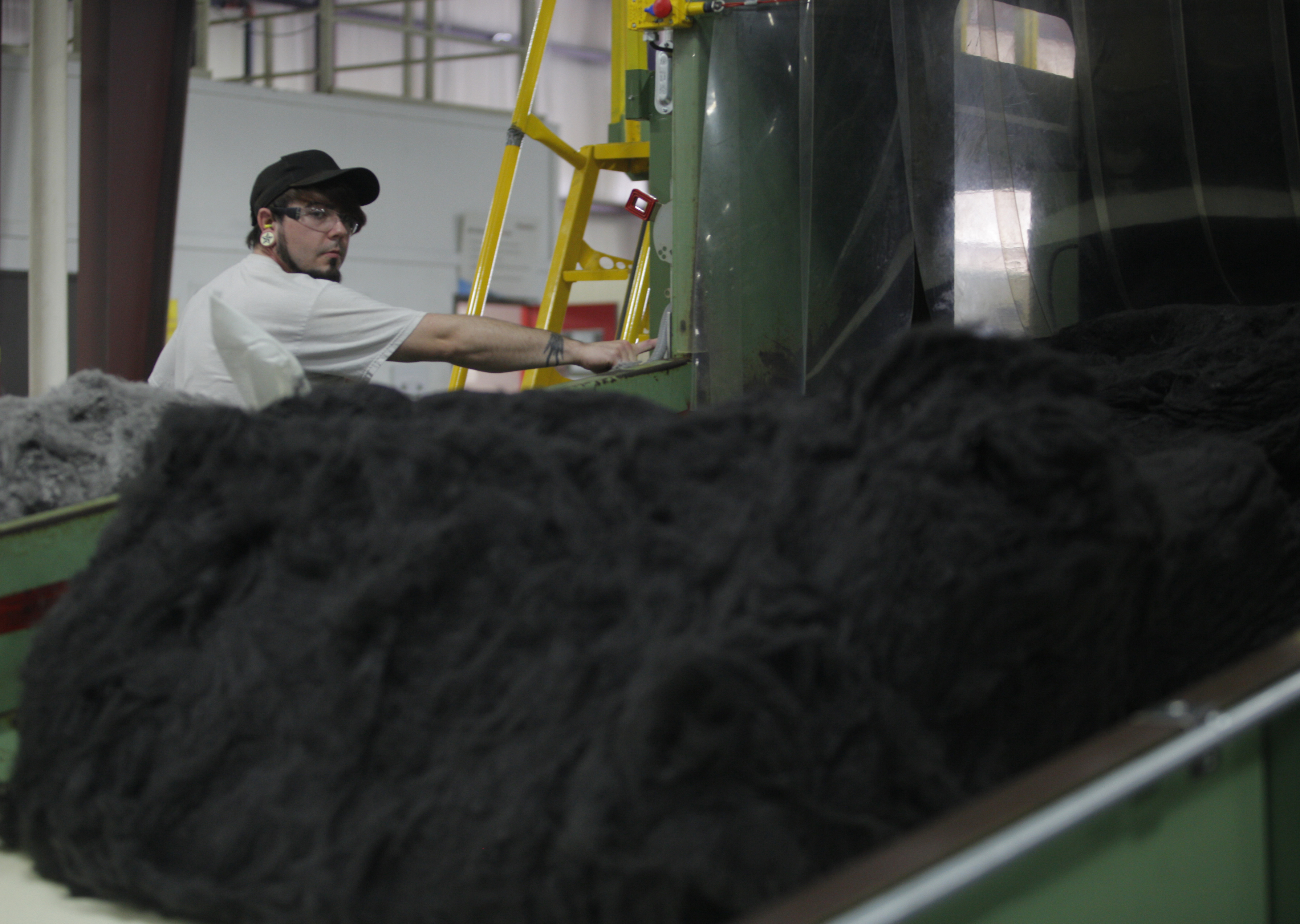 Operator tech Jesse Sain watches a batch of raw fibers get drawn into a machine at the Propex plant in Ringgold, Ga., on March 14, 2012. Propex has moved its production focus from carpet backing to industrial and infrastructure geotextiles, including materials used in waste containment, asphalt laying, and concrete construction.
Operator tech Jesse Sain watches a batch of raw fibers get drawn into a machine at the Propex plant in Ringgold, Ga., on March 14, 2012. Propex has moved its production focus from carpet backing to industrial and infrastructure geotextiles, including materials used in waste containment, asphalt laying, and concrete construction.AT A GLANCEName: PropexHeadquarters: ChattanoogaStaff: 2,420 employeesLocations: 10Factory space: 5 million square feet of manufacturing2011 growth rate: 20 percentNew workers: 100Carpet backing revenue, 2011: $120 millionOverall revenue, 2011: More than $450 millionProducts: Soil and erosion control, concrete reinforcement, building weatherization, specialty products, impact protection, carpet backingSource: PropexLOCATIONSChattanooga headquartersChattanooga plantHazlehurst, Ga., plantNashville plantRinggold, Ga., plantBrazil plantGermany plantMexico plantU.K. sales officeHungary plantSource: PropexTIMELINE1950s - Amoco scientists discover PTA, a chemical used in the production of polyester fibers and carpet backing; open Amoco Fabrics and Fibers.1960 - Amoco acquires Patchogue Plymouth Mills and later begins manufacturing carpet backing from polypropylene, a petroleum byproduct.1967 - Rival Synthetic Weavers opens in Chickamauga, Ga., with a single contract to produce sandbags for the Vietnam War.1970s - Amoco and what is now Synthetic Industries (SI) develop concrete reinforcement products.1980s - Both companies begin developing concrete reinforcement products.1990s - Amoco's German plant launches composite product used to strengthen shoes and luggage.1998 - Amoco merges with British Petroleum.2004 - BP Amoco Fabrics and Fibers becomes Propex Fabrics.2006 - Propex Fabrics acquires Synthetic Industries.2007 - Housing crisis begins.2008 - Propex files for bankruptcy.2009 - Minnesota-based Wayzata Investment Partners buys Propex out of bankruptcy.2010 - Propex diversifies, developing 20 non-carpet backing products, closes Bainbridge, Ga. plant.2011 - Under new CEO Mike Gorey, Propex grows by 20 percent in year.Source: Propex, BP
Chattanooga-based Propex will shift its focus to infrastructure products and de-emphasize the carpet-backing business as the company prepares to move its headquarters downtown.
Officials were quick to say that carpet backing will remain an important legacy product as Propex overhauls itself, but the manufacturer will nonetheless turn toward erosion control and concrete reinforcement as core businesses.
"Whenever a company goes through turmoil, there's always a galvanizing moment," said CEO Michael Gorey. "We're still the largest carpet-backing company in that world that's not connected to a carpet manufacturer. But the key to transformation in business is to move where the market is."
The market has changed quite a bit since Propex spun off from BP Amoco Fabrics and Fibers in 2004.
Propex took on debt and entered bankruptcy after it acquired rival Synthetic Industries in 2006, losing $84 million before Minnesota-based Wayzata Investment partners bought it out of bankruptcy in 2009.
Overall sales at Propex during the housing crisis tumbled to less than $400 million in 2010 from $700 million in 2007, Gorey said.
Meanwhile, sales of carpet-backing material --formerly the mainstay of Propex's business -- plunged during the recession before rebounding slightly to $120 million in 2011, just a third of its all-time high of $330 million, according to figures supplied by Propex.
"Much of this decline was due to the large carpet mills' backwards integrating into the backing business and to a 40 percent drop in carpet sales," said Kemp Harr, publisher of Floor Focus magazine.
Though the housing market and dependent industries like carpet manufacturing have made some promising noises so far in 2012, those markets are a long way from a full recovery, which analysts believe could be up to two years away.
And even if housing weren't struggling, Propex would still have to compete in a carpet-backing marketplace where three of its biggest potential customers -- Shaw Industries, Mohawk Industries and Beaulieu of America -- already make their own carpet backing.
In fact, Shaw Industries bought a large carpet backing mill in Chickamauga, Ga., just before the Propex merger.
Under the new plan, Propex's ill-timed purchase of Synthetic Industries' remaining product lines could actually end up saving the day.
Although the debt from the purchase initially dragged the company into the red as recession took hold, the product lines Propex got out of the deal -- geosynthetic and concrete businesses -- could now lead it to profitability, Gorey said.
BACK IN BUSINESS
Since Gorey took over, Propex has already pulled back from the brink, growing sales by 20 percent in 2011, he said.
"The first step was to stabilize the business, and in 2011 we turned it from a business that's losing money to a business that's making money," he said.
The company even made its first corporate donation in several years, sending a $1,000 check to the American Cancer Society last week and raising another $1,300 in employee donations in preparation for the Relay for Life.
"Finally, the company can get back in the game," Gorey said.
Propex also has brought on 100 new staff to handle its pivot, including 32 headquarters jobs. Among those hires is new corporate director of marketing John Maynie, an executive who formerly worked for General Electric and Ford Motor Co.
The new headquarters employees could find themselves moving downtown to an as-yet undetermined location from the company's spot on Lee Highway if a tentative lease agreement goes through, officials said.
"It's exciting times right now for us at Propex," Maynie said.
Despite the new focus on noncarpet products, there are no planned changes for the company's 2,420 employees at its 10 locations in the short term, he said.
Instead of closing locations, the company will simply retool to increase production of products in demand, officials say.
"When you look at the U.S. and world, and you start talking about the infrastructure needs, our country was graded a D when the federal government did an analysis, and that's where we think we can support industry and help secure our infrastructure," Maynie said. "Our business is growing."
